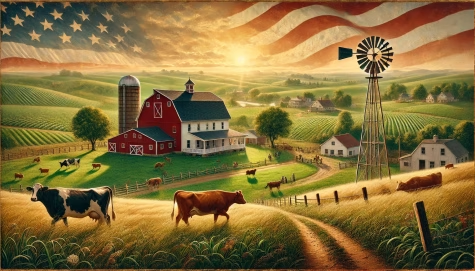
The plight of the American family farm has reached a tipping point, warns Curtis Martin, a grassroots rancher whose passion for stewardship and dedication to quality have been overshadowed by the monopolistic power of corporate meat giants and the suffocating grip of nonsensical regulations. In a powerful interview with Ben Bergquam, Martin painted a vivid picture of an industry on the brink of collapse, urging President Donald Trump to intervene and rebuild the fabric of rural America.
“My motivation isn’t the dollar,” Martin told Bergquam. “It’s being a good steward of the land and producing the best product for the American customer.”
Watch:
Martin’s operation displays the commitment to sustainable practices that he says are undercut by a system designed to favor large corporations at the expense of small producers. He accused these conglomerates, which control over 80% of the U.S. beef industry, of exploiting regulatory loopholes to dominate the market and stifle competition.
A Broken System: The Meat Cartel and Regulatory Overreach
Martin exposed the harsh realities of a system where foreign beef can be labeled as “Product of the USA” after minimal processing. “It’s such a lie and a fraud,” Martin said, highlighting how this practice deceives consumers while undermining local producers. He pointed to a revolving door between regulatory agencies like the USDA and corporate lobbyists as a key driver of this corruption.
“Regulations have been weaponized,” Martin explained, describing how small businesses are disproportionately affected by requirements like providing private offices and bathrooms for inspectors—rules that have no bearing on food safety. “This isn’t about sanitation; it’s about eliminating competition,” he said.
Martin underscored the devastating impact of this corporate-government collusion on local economies. “The family farm and ranching operations are being eliminated. We don’t have the income to sustain what we do, even though beef prices have doubled,” he lamented. Rising energy costs and inflation have only compounded the crisis, leaving grassroots producers struggling to survive.
Environmental Jihadists: A Threat to Rural America
Adding to the burden are what Martin called “environmental jihadists,” whom he accused of promoting destructive policies under the guise of conservation. He criticized these groups for allowing rangeland to burn in wildfires while imposing restrictions that hinder effective land management.
“These elitists sit in their ivory towers and think they know better than the people who’ve lived and worked on this land for generations,” Martin said. He argued that true environmental stewardship comes from those who depend on the land for their livelihoods. “If I were to abuse the land or water, I’d be the first to suffer economically. Taking care of this land isn’t just the right thing to do—it’s essential to my survival.”
A Call to Action: Rebuilding the Fabric of America
Martin appealed directly to President Trump, urging him to champion the cause of America’s farmers and ranchers. “Please, you’ve got to listen to the American grassroots producers—the farmers and ranchers,” he implored. Martin dismissed national organizations as corrupted by corporate influence and emphasized the importance of hearing from those on the ground.
“We need to rejuvenate our rural communities,” he said. “The family farms and ranches are the fabric of America.”
Martin’s message resonates far beyond the beef industry. It’s a call to protect small businesses and prioritize the needs of hardworking Americans over corporate greed and regulatory overreach. “Get the truth from the people who live out here,” Martin urged, emphasizing that only by empowering local producers can the country reclaim its agricultural heritage and ensure a future for the next generation.
A Fight for Survival
Martin’s interview is a stark reminder of what’s at stake: the survival of the American family farm, the integrity of the nation’s food supply, and the future of rural communities. His plea is not just for regulatory relief but for a broader recognition of the vital role small producers play in sustaining the country.
“We’re not just producing beef,” Martin concluded. “We’re preserving a way of life, a legacy, and a promise for the future.”
